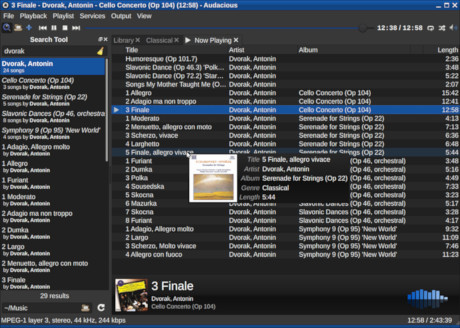About Audacious
Audacious is an open source audio player. A descendant of XMMS, Audacious plays your music how you want it, without stealing away your computer’s resources from other tasks. Drag and drop folders and individual song files, search for artists and albums in your entire music library, or create and edit your own custom playlists. Listen to CD’s or stream music from the Internet. Tweak the sound with the graphical equalizer or change the dynamic range with audio effects. Enjoy the modern Qt/GTK themed interface or change things up with Winamp Classic skins. Use the plugins included with Audacious to fetch lyrics for your music, display a VU meter, and more.
Audacious runs on Linux, BSD derivatives, macOS and Windows. To download and install the latest version (currently 4.5.1), please see the download page.
If you have trouble installing or running Audacious, feel free to ask for help on the forums. You can also request a new feature or report a bug here, but please check the list of common problems first. Also remember that the developers of Audacious are volunteers and can only spend a limited amount of time on the project. If you request a major design change or report a bug without enough information for us to reproduce it, you will probably be ignored.
We can always use more help developing and translating Audacious. If you need help getting started, ask on the forums.
News
Audacious 3.2.3 released
May 26, 2012This release fixes several bugs (#91, #99, #102, #108, #111, #113, #114) and updates some translations.
Audacious 3.2.2 released
March 31, 2012This release fixes various bugs, includes new translations and few improvements.
Audacious 3.2 released
January 20, 2012New version brings music library feature, MPRIS 2 support, performance improvements, and more.
Audacious 3.1.2 released
January 04, 2012This point release in the 3.1 branch fixes a few bugs.


